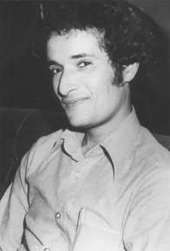Said Sifaw El Mehroug
In collaboration with the Sifaw Association
|
In a Tunisian clinic, after years of suffering following a car "accident", Said El Mahroug, otherwise known as Sifaw, passed away in 1994. This poet, born in 1946 in Jadou in the Nefousa Mountains, (a Berber-speaking region of north-west Libya), remains the figurehead of the Libyan Berber identity (Amazigity). He left his rural birthplace in the mountains, with his family, when he was still very small to live in Tripoli where he went to primary and then secondary school. He then went to medical school in Egypt. His grant was however withdrawn because he was already politically active and had had his articles published on a regular basis. He therefore went back to Tripoli and enrolled at the Law Faculty in 1967, and after having been to law school in the US, he returned home to a job in an oil company.
With the military take-over in 1969, freedom of political and intellectual speech was to undergo even greater repression. Kaddafi’s totalitarian regime, preaching an integral Arab type of socialist nationalism, try to homogenise society and its thinking by eliminating all dissidence. Sifwa, as a committed intellectual and a pro-Berberist, had to face a double threat from the dominant ideology. He did not flinch from this challenge and fought his battles on several fronts. |
Sifaw joined the Libyan Writers’ Union, where he made his political and intellectual opinions known. He also worked at putting together a collection of old tales and myths in Amazigh, his banned mother tongue. As a dissident, he brought down the ire of the authorities on his head. After being subject to many incidents of police harassment, he had a very serious car "accident". Paralysed, battling with many problems on the administrative, medical and legal fronts which finally finished him off psychologically, he died on the 28th of July, 1994.
Even if he was a committed intellectual, Sifaw was above all a poet. He wrote in Arabic and Amazigh. His poetry, of which only a small part was published and that mostly in Arabic, describes the uncomfortable position the Libyan, especially the Berber, finds himself in. Sifaw used to say that writing poetry in Libya could be considered as a crime. And it was this crime that he chose to commit.
Sifaw’s poetry talks about the difficulties of writing in a country where everything is gradually being forgotten: language, names, history….
Even if he was a committed intellectual, Sifaw was above all a poet. He wrote in Arabic and Amazigh. His poetry, of which only a small part was published and that mostly in Arabic, describes the uncomfortable position the Libyan, especially the Berber, finds himself in. Sifaw used to say that writing poetry in Libya could be considered as a crime. And it was this crime that he chose to commit.
Sifaw’s poetry talks about the difficulties of writing in a country where everything is gradually being forgotten: language, names, history….
|
So many people
Have forgotten their names After having forgotten Their accent. |
Paralysed, he could only depend on his memory for the ancient myths and to recreate the world:
|
I will bring Satan with me
Back to paradise |
Of all his writings, only a collection of tales translated into Arabic, "The Voices of Midnight" and a collection of poems "Silent Poems" were published. The rest, mainly all of his writings in Amazigh – old folk tales, poems and a grammar book on the Nefousa dialect – are to be found here and there in the private collections of his closest friends. Some of his poems in Amazigh can be found on this site.


